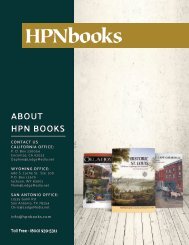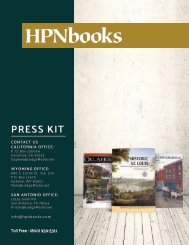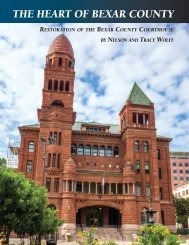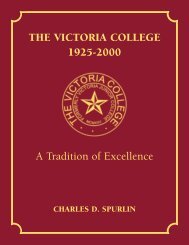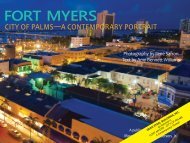In The Cradle of Industry and Liberty
An illustrated history of Philadelphia's manufacturing sector paired with the histories of local companies that make the city great.
An illustrated history of Philadelphia's manufacturing sector paired with the histories of local companies that make the city great.
You also want an ePaper? Increase the reach of your titles
YUMPU automatically turns print PDFs into web optimized ePapers that Google loves.
Just as the era <strong>of</strong> large breweries was<br />
ending in Philadelphia, however, the craft<br />
brewing phenomenon was getting underway.<br />
Philadelphia’s first craft brewer, Dock Street<br />
Brewing Company (named in honor <strong>of</strong> the<br />
city’s earliest breweries along Dock Creek),<br />
was established in 1985. Others followed,<br />
including Sam Adams, <strong>In</strong>dependence, <strong>and</strong><br />
Yards Brewing Company, along with a number<br />
<strong>of</strong> brew pubs that made smaller amounts <strong>of</strong><br />
beer that they sold on their premises. By<br />
the closing years <strong>of</strong> the twentieth century<br />
Philadelphia had become a vibrant center<br />
in the craft beer movement. It remains so in<br />
the 2010s.<br />
<strong>The</strong>re was no equivalent to the craft beer<br />
movement in the sugar industry. With the<br />
closing <strong>of</strong> Philadelphia’s last two refineries,<br />
Jack Frost (formerly Pennsylvania Sugar<br />
Refining <strong>and</strong> popularly known as “the Sugar<br />
House”) in Fishtown in 1981 <strong>and</strong> Amstar<br />
(formerly Franklin Sugar <strong>and</strong> Domino Sugar)<br />
in South Philadelphia in 1982, sugar refining<br />
in the city came to an end. <strong>In</strong> a fitting piece <strong>of</strong><br />
symbolism, the Sugar House property gave<br />
rise to Sugar House Casino in 2010—what had<br />
once been a major manufacturing site became<br />
home to the epitome <strong>of</strong> a service industry.<br />
@<br />
Historic <strong>and</strong> modern aerial views <strong>of</strong><br />
the Atlantic oil refinery in Southwest<br />
Philadelphia, both looking north with the<br />
Philadelphia skyline in the background.<br />
Top: View <strong>of</strong> the refinery, with the Schuylkill<br />
River in the foreground, c. 1926.<br />
AERO SERVICE CORPORATION COLLECTION,<br />
LIBRARY COMPANY OF PHILADELPHIA.<br />
Above: View <strong>of</strong> the same refinery, owned by<br />
Philadelphia Energy Solutions, c. 2010s.<br />
PHOTO COURTESY OF PHILADELPHIA ENERGY SOLUTIONS.<br />
<strong>and</strong> process some fourteen million gallons <strong>of</strong><br />
crude oil daily in the mid-2010s, constituting<br />
the largest as well as the oldest continuously<br />
operating oil refining complex on the American<br />
east coast.<br />
BEER AND SUGAR<br />
By the latter part <strong>of</strong> the twentieth century,<br />
the beer <strong>and</strong> sugar industries in Philadelphia<br />
had each consolidated down to just two<br />
surviving firms: brewers Ortlieb’s <strong>and</strong><br />
Schmidt’s <strong>and</strong> refiners Jack Frost <strong>and</strong> Amstar.<br />
All four remained large-scale manufacturers<br />
into the early 1980s but were gone by the<br />
end <strong>of</strong> the decade. Ortlieb’s went out <strong>of</strong><br />
business when it was purchased by rival<br />
Schmidt’s in 1981. When Schmidt’s itself<br />
closed in 1987 it marked the first time in<br />
over three hundred years that Philadelphia<br />
did not have a major operating brewery.<br />
OTHER MAJOR<br />
FOOD PROCESSORS<br />
If large-scale food processing in Philadelphia<br />
ended in the sugar <strong>and</strong> beer industries in the<br />
1980s, it continued in the city’s other food<br />
sectors, anchored by several longtime local<br />
companies making snack cakes, lunch meats,<br />
<strong>and</strong> rolls. Tasty Baking Company was founded<br />
in 1914 by two new arrivals to Philadelphia,<br />
baker Philip Baur <strong>and</strong> egg salesman Herbert<br />
Morris, who had the novel idea <strong>of</strong> selling<br />
individually wrapped, fresh-baked snack<br />
cakes. <strong>The</strong>y originally set up shop in<br />
Germantown, but early success led to the<br />
opening <strong>of</strong> a large plant in 1922 on Hunting<br />
Park Avenue in Nicetown, down the street<br />
from the Budd Company. Known to locals by<br />
the name <strong>of</strong> its signature product, Tastykake,<br />
the company’s baking facilities ran twentyfour<br />
hours a day, six days a week, producing<br />
snack cakes <strong>and</strong> pies that made their way<br />
IN THE CRADLE OF INDUSTRY AND LIBERTY<br />
88





